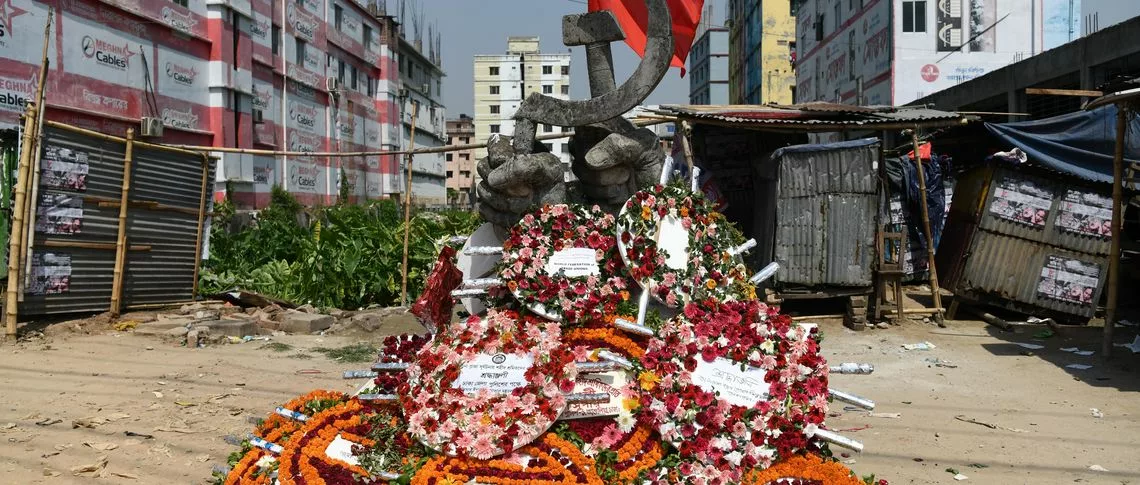There’s been Progress but still Persistent Challenges in the Garment Industry–is Upcoming legislation key to change?

April 24, 2024 is the 11th anniversary of the Rana Plaza collapse, a day etched in the collective memory of the global fashion industry as one of its darkest hours. The tragedy claimed the lives of 1,138 workers and spotlighted the hazardous conditions faced by garment workers in Bangladesh. This catastrophe was not just a structural failure; it was a stark revelation of the industry’s systemic exploitation and disregard for worker safety.
Safer Factories: A Step Forward
In the aftermath of the collapse, a concerted push from unions and labor rights groups to overhaul factory safety led to the Accord on Fire and Building Safety in Bangladesh. This agreement, signed by over 200 global brands, facilitated significant improvements in factory conditions, from installing fire safety equipment to structural renovations. Factories have become safer now, and measures have markedly reduced the likelihood of another mass casualty incident like Rana Plaza.
However, not all brands have stepped up. Significant players like Levi’s and IKEA have not joined the Accord, continuing to rely on inadequate self-regulated checks. This reluctance undermines broader efforts to enforce safety standards across the industry.
The Unresolved Issue of Poverty Wages
Despite safety improvements, the root causes of the Rana Plaza tragedy persist—chief among them poverty wages. In 2023, the legal minimum wage rose to 12,500 BDT (approximately 113 USD), still falling significantly short of a living wage. Brands often directly suppress wage increases by leveraging their purchasing power to maintain low costs, indirectly contributing to wage stagnation at their supplier factories.
Freedom of Association Still Under Threat
The freedom to organize and collectively bargain remains heavily constrained in Bangladesh. Recent crackdowns on workers protesting for fair wages have been both violent and deadly, with several deaths and many injuries reported. Despite the evident risks, major brands have largely failed to intervene or support their workers’ organizing rights.
Legal Challenges and Corporate Accountability
Numerous workers face legal repercussions for participating in protests, with brands showing little initiative in advocating for the dismissal of these charges. The legal framework remains tilted against labor organizers, who are frequently targeted and intimidated.
Looking Ahead: The Corporate Sustainability Due Diligence Directive
On a hopeful note, the European Parliament, on April 24, will vote on the Corporate Sustainability Due Diligence Directive, which aims to hold companies accountable for labor violations in their supply chains. This legislation represents a crucial step towards ensuring that brands can no longer neglect their responsibilities towards workers in their global supply chains.
Muriel Treibich, Lobby and Advocacy Coordinator for the Clean Clothes Campaign, says:
“For the first time over the last decade, this day of commemoration will also be a day of hope. On the day where we remember the lives lost in the Rana Plaza collapse, this vote represents a significant milestone for workers, communities, and activists worldwide and a major step for corporate accountability.”
What are the benefits of these new rules?
For Citizens
- Better protection of human rights, including labor rights.
- Healthier environment for present and future generations.
- Increased trust in businesses.
- More transparency enabling informed choices.
- Better access to justice for victims.
For Companies
- Harmonised legal framework in the EU, creating legal certainty and level playing field.
- Greater customer trust and employees’ commitment.
- Better awareness of companies’ negative environmental and human rights impacts.
- Better risk management and adaptability.
- Increased attractiveness for talent, sustainability-oriented investors and public procurers.
- Higher attention to innovation.
- Better access to finance.
For Developing Countries
- Better protection of human rights and the environment.
- Increased stakeholder awareness on key sustainability issues.
- Sustainable investment.
- Improved sustainability-related practices.
- Increased take-up of international standards.
- Improved living conditions for people.
The Road to Genuine Reform
As we commemorate the lives lost in the Rana Plaza collapse, it is clear advocacy and agitation are necessary to break the log-jam of callous disregard for the lives of those who work in the factories. The fashion industry needs a seismic shift in how it views and treats its workers. Brands must comply with new regulations and proactively ensure that their operations and suppliers adhere to the highest human and labor rights standards.
The anniversary of Rana Plaza should serve not just as a day of remembrance but as a call to action to prevent such tragedies from happening again.
–KL Dunn
Related Articles


